- Home
- Scott Turow
Personal injuries kc-5 Page 19
Personal injuries kc-5 Read online
Page 19
The matter was set over for one week to bring in Hardwick. McManis sent a Teletype to D.C. to find an FBI Special Agent from out of town to play the executive. But UCORC intervened. It was one thing for Robbie and Jim to make misleading statements to Crowthers and the other judges who were under investigation; the courts had long approved of that kind of governmental deception as part of an undercover operation. But an FBI agent, sworn on oath, claiming he was Royce Hardwick and testifying about events that had never happened looked and smelled a lot like perjury. That was one of the reasons UCORC's protocols had sought to avoid trials of the contrived matters.
Both McManis and Sennett had to fly out to make a personal appearance at Main Justice, and supposedly the decision to go forward was made by Janet Reno herself. In any case, on the morning of April 8 a rock jawed agent from somewhere in America was in McManis's office, prepared to play Royce Hardwick.
Jim remained unnerved by his performance the week before and amazed at the primitive awe Crowthers was capable of inspiring with that murderous stare compressed beneath his graying brows. Robbie and Stan spent more time coaching McManis than our pseudo-Mr. Hardwick. The agent was relaxed and seemed to understand his part, although he'd be less convincing if he was required to show Hardwick's seedy side.
As they were all heading for court, Sennett pulled me into McManis's office.
"Go with them."
I was incredulous.
"You're the referring attorney," Stan said. "It would make sense if you're there. And I'm worried about Jim with Sherm. We don't want people to start wondering if McManis is really a lawyer. If he needs some cues, it'll look less peculiar if they're not all coming from Robbie."
This was exactly the kind of thing I'd been afraid of. But Stan claimed the request had McManis's blessing, and Jim, in fact, repeated it. Crowthers was a lot to handle, even for courtroom veterans, and Robbie had no objections, so I tagged along, vowing to myself to do nothing, unless there was a four-alarm fire.
McManis had rehearsed the direct examination with the visiting agent at least a dozen times and he was quite poised going through it. `Royce Hardwick' testified according to his script that he'd believed the Forlan lawyer was there to act in his interests and that he had figured what he'd told the lawyer was confidential. McManis tendered the witness for cross-examination, but Sherm never allowed Robbie to stand, or Jim to get out of the way.
"Now just a second here," Sherman demanded. "You mind if I ask your client a couple questions, Mr. Mack Manis?" Caught again in the headlights, Jim failed to answer and Sherm flipped a dismissive hand in his direction. He could do pretty much as he liked on a matter like this. "Now listen here, Mr. Hardwick. You tellin me that when that lawyer from the company asked you what happened you were thinkin he was gonna keep what you told him a secret?"
'Hardwick' took his time with the question. His hands were folded on the shellacked birch rail of the witness stand and he maintained an impressive executive timbre in answering yes.
"So you must have told him the truth, then, huh?"
Caught short, Hardwick sat back. Sherm had scooted his chair all the way to the partition between the bench and the witness stand, but that apparently was not advantage enough. He now stood, looming seven or eight feet over Hardwick.
"Heard me, didn't you? You wouldn't lie to your own lawyer, would you?"
"Well, Judge, I really-I don't know."
"You don't? You mean you'd send Mr. Mack Manis here to tell lies to me?"
Hardwick, who'd had to lean back to about forty-five degrees to face Sherm, said of course not.
"No," said Sherm, and shook his huge head. "I didn't think so. So if this lawyer's got some notes and memos about what you said had been passing between you and Olivia King, those things must be true. Right?"
"Well, I don't really remember what happened back then anymore," Hardwick said, repeating the lines he'd rehearsed. "My whole life fell apart. It's just a big jumble."
"I been hearin you say that. But you don't have any memory of lyin to that lawyer, do you? That's what I'm askin you now. Did you lie, far as you remember?" Sherm put his hands on the partition and pushed his large face down toward Hardwick's, breaching a space between interlocutor and witness that he would have drawn and quartered any lawyer for violating. Hardwick actually let one arm rise up defensively before he said no.
"That's what I'm sayin. Course you wouldn't lie. So if that lawyer says you admitted you were all worked up over Olivia King, that you'd been bothering her and pestering her, following her to work and calling her vile names in these letters, you were tellin the truth, weren't you, best you remember?"
Hardwick's eyes lit first on McManis, who still stood mute, then revolved past him as the witness searched the courtroom for help. I had some dwindling thought of passing Jim a note to tell him to object, but that only figured to inflame Crowthers more. Besides, I reminded myself, McManis was there to lose.
"I guess," Hardwick finally answered.
"Idn't any reason to think otherwise, right?"
"Right."
"Okay," said Sherm and finally beat his large head up and down. With that he returned his attention to McManis at the podium. "Okay. So what I'm tryin to figure is what we-all are doin here, Mr. Mack Manis. Client just admitted on the record in this case same things he supposedly said in confidence to that lawyer. Di'nt he?" Sherman revealed his large irregular teeth in a mischievous smile. "Nothin for me to rule on, is there? Dudn't matter whether the statements he made before are privileged, cause there's no way what he just said right here doesn't come into evidence-is there?"
Sherman, when he laughed, let his tongue slide through his teeth, and he emitted a wet sputter under his heavy gray mustache. He enjoyed himself while his mean lesson sunk in around the courtroom. He'd obviously demanded McManis produce his client so he could batter a new set of admissions out of Hardwick, avoiding a difficult ruling in the process. Sennett, when he heard about this turn of events, was delighted. Talk about a judge on the take! But, sitting there, I had no thought that corruption played any part in what Crowthers had done. It was just Sherm being himself, savoring the gratification he got by clobbering a jerk like Hardwick and by demonstrating that the best attorney in the courtroom was the one up on the bench.
As Sherm took his seat again, still chuckling and tossing his head in amusement, McManis came out with his only line of protest.
"But, Your Honor!" he said.
Crowthers threw his big hand Jim's way, disregarding the objection, and went on drafting the order.
We all left the courtroom together and climbed into an elevator, where we were alone in the car. Robbie, who'd had the good sense not to speak a word during the hearing, finally piped up.
"'But, Your Honor,"' he wailed, just once. Hardwick had no comprehension what the laughter was about.
CHAPTER 20
Feaver joked that Evon was working half days, since she was with him every minute now, 6 a.m. to 6 at night, seeing him back and forth from his house. The Feaver residence was English manor-style, with a long shake roof and yellow stucco between the outer members of the upper story. The structure was surrounded by a crisp lawn and decorative landscaping, but it looked entirely out of place here amid the prairie flatlands west of the city where the only trees had been planted by gardeners a few years before.
Glen Ayre, the suburb, was a former cornfield on which some developer had set down dozens of gigantic houses. Everyone here was like Robbie, rich and eager to show it. Huge luxury cars sat out in the driveways, and the alarming freakish shapes of satellite dishes reared up along the rooflines. The kids were obviously spoiled; you could tell just by the basketball standards the parents had driven into the earth beside the driveways, with cranks to raise and lower the rim, and snappy acrylic backboards.
The rich to Evon were Other People. She'd never envied much of what went with money. Merrel's husband, Roy, was a businessman, an MBA, who traveled all over the world and seemed to ship dolla
rs home by the suitcaseful, but Evon wasn't certain it had done her sister much good. Clubs and fashion, the competition to keep up often seemed to have constricted Merrel's life.
When Evon climbed into the Mercedes each morning, Robbie was cheerful as a sunbeam. He zipped along, entertaining her with chatter, while she remained in the sullen funk of the sleep-deprived, still grieved that his circus act with Judge Medzyk had cost her another hour in bed. Their first stop, a few miles in the wrong direction, was his mother's nursing home. While he was inside, Evon read the paper. She pushed her seat back, reclined, took in the aroma of the leather. The engine ran and she had the enormous solid machine to herself. One morning he decided to invite her inside.
"Hell, come on, you'll meet my ma." It seemed unthinkable to him that she would have no interest. And she did, actually. She was curious about the woman who'd borne him.
The result of Mrs. Feaver's stroke last year was a nearly total hemiplegic paralysis. She had no use of her left leg and only marginal ability to move the arm on that side. But she still could speak, much as Robbie occasionally wished that weren't the case; after therapy she had no audible impairment. Mrs. Feaver's home, the apartment in which Robbie had grown up, was a second-story walk-up, which she'd had to abandon as a result of her disability. Robbie had wanted to take her into his house, but his mother, even in her weakened state, would hear none of it. He had enough on his hands with Lorraine. After much discussion, this nursing home seemed to be the best alternative. It cost him a left lung, he said, which made him feel a little better.
Today Estelle Feaver sat upright in a padded day chair, dressed and ready for breakfast, which was still some time away. She held on to her heavy black-framed glasses with one hand, as if this might improve her vision, while she extended her neck turtle-like in the effort to follow the TV suspended on the opposite wall. Judging from the volume, her hearing, too, was failing. The utter immobility of her left side was apparent even from the doorway. Her arm hung down like wet laundry. She did not realize they had entered the room until Robbie was quite close to her. When she saw her son, she threw her right hand in the air, then recovered enough to whisk the glasses from her face and bury them in the folds of her skirt.
"Rob-bee!" She fell into his arms and lifted the one good hand to his shoulder. She held him for quite some time until her cloudy, dark eyes found Evon.
He introduced his new paralegal. To account for the fact that they were together so early in the morning, Robbie claimed they were heading to court. His mother's mouth went through a series of sour reflexes that signified disbelief, but she looked away rather than castigate her son for his antics. Robbie, as always, happily avoided unpleasantness.
"She looks great, doesn't she look great?" he asked Evon. Mrs. Feaver in fact looked simply old. Her skin was engraved by heavy wrinkles which the thickly applied base and makeup did not really hide, and the chin beneath her neck hung in several folds that no doubt displeased her. It was clear she continued to take pains with her appearance. Even if Robbie had not told Evon that he engaged a manicurist and a stylist to come to the home weekly, it would have been plain. There was no missing the incredible orangutan orange of the hair dye or the popping red paint on her nails; they contrasted too pointedly, both with the glum surroundings and with her decrepitness-the bent spine, the pallid spotted hands, the rattling cough. Looking at Mrs. Feaver, Evon found it difficult even to say that she might once have been attractive. Her nose was hawkish and her false teeth, on which some of her bright lipstick was smudged, seemed to have altered her jawline. But she was a force. You could feel that much. She brushed aside her son's compliments with a show of bashfulness.
"Well, it's just for him," Estelle said. "Who else sees me in this place?"
In his cheerleading fashion Robbie again extolled the way his mother took care of herself, once more inviting Evon to chime in with praise of her own. She'd have been willing to flatter an old woman, although she'd never had much enthusiasm for ladies in war paint, the way they felt it was a female's responsibility to be so much more colorful, more glittering and glamorous than God and nature had made them. These days her own hair was barely combed; she was growing more perfunctory with her Elizabeth Ardent makeup every morning, and she'd taken the color off her nails several weeks ago.
But there proved no need to patronize. Mrs. Feaver continued as if Robbie had not invited Evon into their conversation. Evon saw quickly that, at least as far as Mrs. Feaver was concerned, no one really intruded on her relationship with her son. And in fact, as Robbie and his mother went on chortling over events here in the home, Evon realized that the same was true for him. They were so happy in each other's presence! Robbie tended to speak of his mother as if she were a drain. But it was his disinterest, his objectivity, that was feigned. The man was really a through-and-through fake. He was as clearly bound to her as she was to him; his litany of compliments even, as her body failed, seemed sincere, a measure of the comfort he took in her physical presence. He held on to her hands as he questioned her about the doctor's latest report, while his mother lingered contentedly in the hot light of his interest.
"Oh, the doctors. What do they know? You think you get Nobel Prize winners in here?" She squinted at Evon, her harsh voice reduced to a whisper. "They're all foreigners. They're here for the Medicare. They give them I don't know what, six bucks for every old bag they glance at. They run through here like their pants are on fire. I can't even pronounce the names. Shadoopta. Baboopta. God save me if I ever needed to call one. I'd just be dead."
Robbie received this speech, like everything else the old lady said, with great mirth. He hugged her again, and then, after further banter, motioned Evon to go. To detain him, Mrs. Feaver inquired after Lorraine.
"Eh," he answered.
"My son. His wife and his mother, one sicker than the other. Sometimes I'm alone, I cry for him, it's such a terrible thing. Who takes care of Robbie?"
He was jiggling the water pitcher throughout this speech. But he heard her, apparently. He reminded her about Mort.
"He always sees the bright side," answered Mrs. Feaver. "He makes jokes anyway. He's on the economy plan with Hospital Supply. My God."
"Hey, shaddup, willya?" He leaned over and kissed her brow.
"So you'll come tomorrow?" Mrs. Feaver asked somewhat plaintively.
"Wouldn't miss it for the world. End of the day. I got court in the morning." He waved, then shot down the hallway. Mrs. Feaver watched his departure with dismay and did not respond when Evon lingered at the threshold to say it had been a pleasure.
"So that's my ma. A pistol. right? There's only half of her left and she's still full of beans." Advancing down the corridor, each doorway revealing another frail body, shattered by age and disease-the skin parchment-colored and like a luffing sail, mouth toothless and desperately agapeRobbie managed another thrilled laugh.
Seeing what was required, Evon made the previously suspended remark about how well Mrs. Feaver kept herself.
"Yeah," he said again. "She looks great. She's always looked great. I mean, when I was a kid-" He rolled his eyes. "You look at the pictures now, I don't know, it's not like she was Liz Taylor or anything, but she had something. Pizzazz? Vitality. What was Jackie Gleason's old line. 'Va va va vooooom!' She was always put together really nice. She was going out and selling and looking good at it. Still today, I'll smell Chanel Number Five-Channel Five, I used to call it-and I'll think about my ma, hugging me before she ran off to the store.
"Guys dug her. I could tell that. And she was like a lot of pretty women I've known, she liked being dug. She liked the power of it, I think. I could always tell that she loved walking down the street on the way home from work. In those straight skirts and high heels? The neighbor guy, in his sleeveless undervest, smoking a cigarette and pushing a hand mower over the little strip of city lawn, would stop and draw a smoke and take a real long look, even shake his head for mercy once she went past. She loved that. Half the wive
s in the neighborhood wanted her arrested. They called her 'Sophia Loren,' and not to be nice."
They were crossing the parking lot by now. The temperature had increased and the sun was seen some days now, but winter, a stubborn old witch, held on. The sky was piled with ugly soiled messes of clouds. Robbie, caught up in his reverie, looked to the pavement where oily rainbows had gathered.
"I think, you know, when it came to the actual act, she was probably pretty prudish, like a lot of ladies that age. I mean, I don't really know. She had one boyfriend for a while, a few years after my old man skipped, but that came to the usual sad ending, and after that she pretty much scrapped the whole notion. I caught her crying one night and telling herself and me it was for the best. He was a goy. A gentile. And younger than her. I was frantic. I couldn't stand that she was crying. I was eleven years old and I wanted to go after this guy with a bat, especially when I began to get the picture. With my mother?" Robbie had a sudden laugh. "I still would," he said. "I'd still like to kill him." His breath, turned to smoke by the cold, raced upward and he smiled at Evon, inviting her to laugh with him at his sudden recognition of himself.
CHAPTER 21
The Hash Sennett had made of the first encounter with Judge Skolnick left him with serious tactical problems. Robbie could have employed the usual gambit, announcing that the case of the painter with cancer had settled and making his drop. But Stan felt he'd be left with a relatively weak case on the judge, much less imposing than what he needed to finally get Washington off his back. Skolnick's lawyer would argue to a jury that the first payoff had been refused-the recording supported that-and that the second, even if accepted, was not intended to influence any official act, since Skolnick had emphasized in the Lincoln that he would stay discovery for any party.
Instead, Sennett decided that Robbie should appear before the judge with McManis and actually ask Skolnick to grant his motion for judgment on the pleadings, a claim that his client deserved to win the liability phase of the lawsuit without a trial, or even discovery. In his car, Skolnick had said flatly he'd never grant such a request. Sennett, therefore, felt there was little to lose, particularly since Stan thought there was some chance Robbie might even win.

 Testimony
Testimony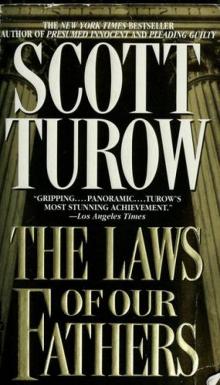 The Laws of Our Fathers
The Laws of Our Fathers Ordinary Heroes
Ordinary Heroes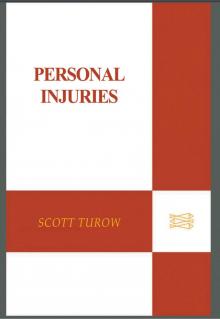 Personal Injuries
Personal Injuries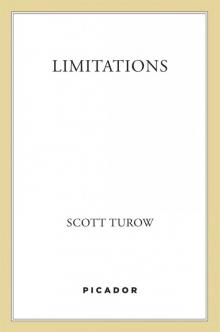 Limitations
Limitations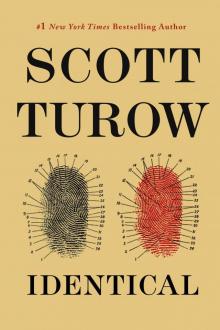 Identical
Identical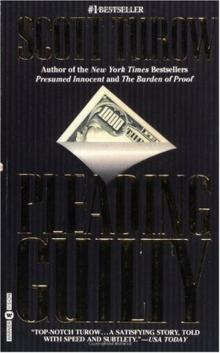 Pleading Guilty
Pleading Guilty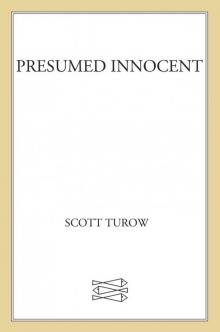 Presumed Innocent
Presumed Innocent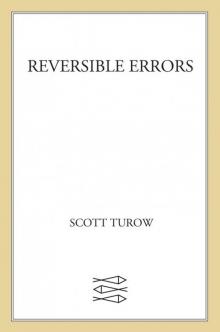 Reversible Errors
Reversible Errors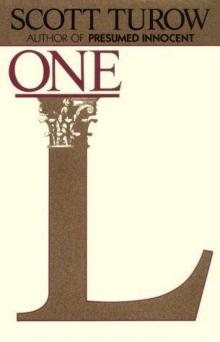 One L: The Turbulent True Story of a First Year at Harvard Law School
One L: The Turbulent True Story of a First Year at Harvard Law School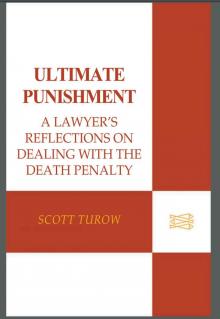 Ultimate Punishment
Ultimate Punishment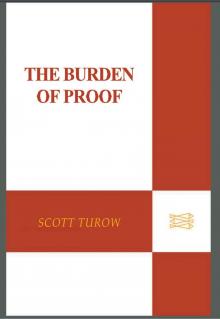 The Burden of Proof
The Burden of Proof Ordinary Heroes (2005)
Ordinary Heroes (2005)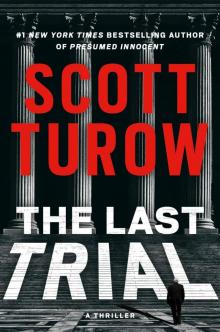 The Last Trial
The Last Trial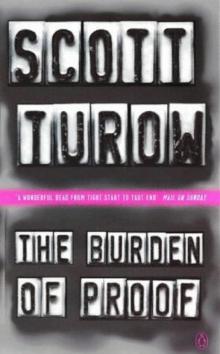 The Burden of Proof kc-2
The Burden of Proof kc-2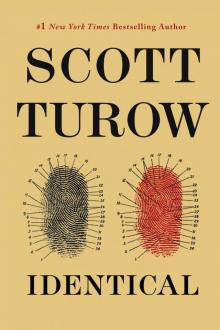 KC09 - Identical
KC09 - Identical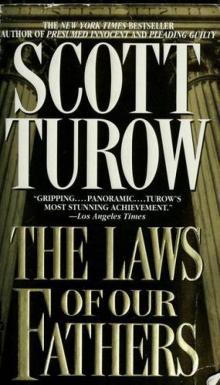 The Laws of our Fathers kc-4
The Laws of our Fathers kc-4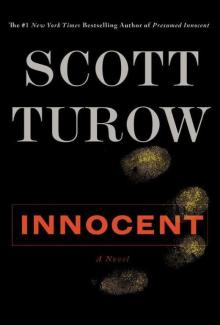 Innocent kc-8
Innocent kc-8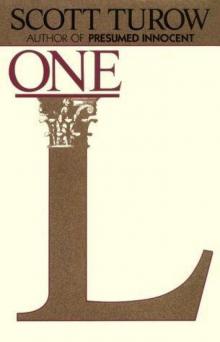 One L
One L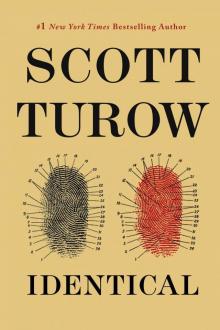 Identical kc-9
Identical kc-9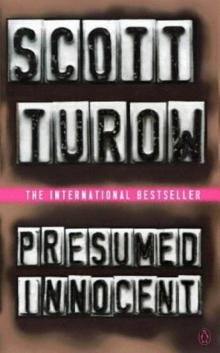 Presumed innocent kc-1
Presumed innocent kc-1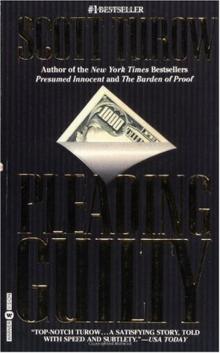 Pleading Guilty kc-3
Pleading Guilty kc-3 One L (1977)
One L (1977)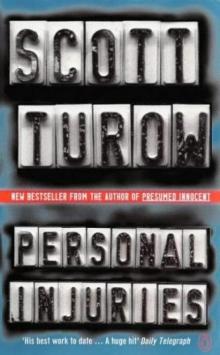 Personal injuries kc-5
Personal injuries kc-5